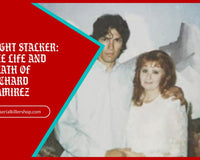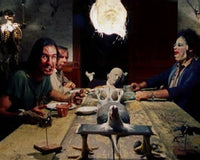In principle, I’m just as against horror movies being remade as I am songs being covered.

Unless you’re in The Jimi Hendrix Experience, you shouldn’t be covering Bob Dylan. If you really want to see or hear something again, you want it to be just like you remembered. Because it was that good.
This prompts a question: How did Hendrix successfully cover Dylan? The answer is simple; his cover was better than the original. The same reasoning applies to successfully remaking a horror film.

There are only two criteria that must be met, but they are crucial:
- The remake must be as good or better than the original.
- If the remake cannot be said to be better, it must be as good as the original on the grounds that it is sufficiently different.
It’s the difference that makes it worth watching, if it's not actually better. It’s a difference in perspective and creative vision that can turn a concept on its head in a way that’s of interest.
 (Image found on film-grab.com)
(Image found on film-grab.com)
That being said, I was excited about the new Poltergeist remake. Sam Rockwell is always phenomenal and the original is a classic. Not to mention, Jared Harris was amazing on Mad Men and the prospect of him being the veteran spiritual-cleanser had me pretty excited. If there was ever a horror remake that had potential, it was this one.

While all the actors lived up to their reputations, I was still largely disappointed.
 (Image found on film-grab.com)
(Image found on film-grab.com)
The effects were cool and the writing was decent. They'd done a great job of seamlessly integrating contemporary gadgets and culture into the narrative: cell phones, toy drones, reality television, etc. Even the comedic relief was largely on point.
But I kept wondering what the incentive was for me to be watching. It was as if they made the movie solely to say they updated Poltergeist. They did. But they didn’t really add anything of worth.

The only major difference was deciding to show the parallel spirit world. If they hadn’t relied so heavily on CGI, it might have been a good idea. Instead, it just looked ridiculous.
Most importantly, it wasn’t scary. Maybe that had something to do with my knowing what was going to happen—I’ve seen the original. But that doesn’t really account for how universally underwhelming its reviews have been.
The explanation for this is simple. Horror remakes aren’t being made in the interest of scaring people. They’re being made because they’re fiscally safe. The Poltergeist remake wasn’t the worst horror remake I’ve seen. It made a profit and it was even enjoyable to watch. But it wasn’t good. It was just barely good enough.

“Just barely good enough” is what’s killing the genre. None of the studios want to take a risk, so they keep churning out remake after remake in an effort to keep afloat. Well, that’s not going to cut it anymore. It’s boring, uninspired, and everyone knows it.
There is only one remake in recent memory that really impressed me. That was Evil Dead. Of course the original is still better, but the remake dared to be different. The remake is ballsy and unapologetic. It doesn’t pretend to be just like its influence. While all the similarities and parallels to the original are obvious, it still stands up for itself.

The studios need to be focusing on innovation rather than updating when it comes to remakes. Better yet, it might be novel to invest in new ideas altogether rather than butchering classic ones. They might even get people back into theaters that way.











